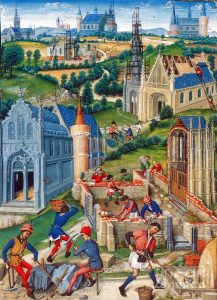Words on the Word
23 Sunday C
Wisdom 9.13-18: What man can know the intentions of God?
Philemon 9-17: I am sending him back with a part of my own self.
Luke 14.25-33: None can be my disciple unless he gives up all his possessions.
Tomorrow is election day in Norway. We shall all exercise our civil right to vote. A month ago I got an SMS from the Election Department reminding me of my responsibility. It is healthy that the state does things like that. It shows that democracy is working.
 What will be the result of the election? Even experienced journalists desist from speculation. We Norwegians have become unpredictable, politically speaking. Many of us vacillate from one party to another, speculating a little on various sides.
What will be the result of the election? Even experienced journalists desist from speculation. We Norwegians have become unpredictable, politically speaking. Many of us vacillate from one party to another, speculating a little on various sides.
Voting has become a bit like shopping. We look for good offers, and expect good service, attention, and some fun along the way. I suppose that is why politicians have made such an effort, in this campaign, to try to entertain.
But is this how a society is founded and maintained?
I’ll leave that question hanging, should any of you wish to give it further thought.
What concerns me here, however, is not the question of voting boxes, but the Gospel we have heard. The text is a stern one. It speaks of radical departure, of perseverance, of the pain fidelity may bring. Jesus rarely speaks more austerely than when he explains what it means to be a disciple.
But is he not exaggerating? Yes, he is. When he says that ‘If any one comes to me and does not hate his own father and mother and wife and children and brothers and sisters, yes, and even his own life, he cannot be my disciple’, it is in order to give us a good shake, to help us wake up to the importance of what is being said. These words must be understood in the light of the great, defining commandment: ‘You shall love your neighbour as yourself’.
He does not ask us to literally hate; but to understand that to follow Jesus is a serious business. It must be our life’s priority number one.
We cannot be Christians just now-and-again, when we feel like it or find we have the energy.
For it is about more than just us, our needs and wants. The Lord calls us into his Church so that we may assist him in his great work: the world’s salvation. He needs people he can rely on, who do what they have promised to do; women and men whose ‘Yes’ means ‘Yes’, whose ‘No’ means ‘No’.
Precisely because we have so largely lost the notion of permanent engagement, be it in politics or in family or consecrated life, we do need Jesus’s words as a standard by which to measure ourselves. Am I faithful in my discipleship, ready to serve when the Lord requires me? Or do I prefer to keep busy with my own stuff, regarding the faith as a pastime?
Jesus gives us two parables to show what he means. The images are powerful.
The first parable compares Christian life to a building project. To start building something, we need a clear plan and sufficient resources. Few of us can afford, at the same time, to build a home in Molde and to holiday in the Maldives.
Any building project calls for sacrifice, whether we are constructing a tower, a romantic relationship, or a life of faith. Sometimes we shall be tempted to give up; it seems simpler to start afresh with something (or someone) else – but is there any joy in leaving a trajectory lined by an increasing number of monuments to keenly begun but swiftly abandoned enterprise? By building we mature. In this way our lives become an edifice, whose architect-in-chief is the Lord. There he constructs a home for himself; there we would hope to create a hospitable place where other people can find comfort, sustenance, warmth.

The second image Jesus uses provides contrast, but points in the same direction. It speaks of a king setting out for war. Is his campaign to succeed, he must have a strategic plan and a sufficiency of soldiers. Life is in so many ways a battle. It has sweetness, by all means; there is much to rejoice in and enjoy. But human existence simply isn’t a trip to the beach with deckchairs, parasols, and endless jugs of piña colada. Many voices round about us would like to make us believe that life is, or ought to be, like that. By holding forth such promises they mobilise (with not much trouble, it must be said) our most egocentric and childish responses.
The world, meanwhile, is on fire; humanity is ailing; hopelessness spreads. And we, we are called to be the servants and friends of Christ Jesus, with a great task to undertake in his name.
Let us use this Sunday to renew our Christian commitment. Let us remember that life, the way we understand it as Christians, cannot be reduced to shallow promises of more free time and more comfortable living. Life, as today’s collect reminds us, is about ‘true freedom and everlasting life’. We cannot be satisfied with less.
‘True freedom and everlasting life’! That is not, incidentally, a bad perspective to keep in mind as we prepare to vote tomorrow.
In the name of Jesus! Amen.
